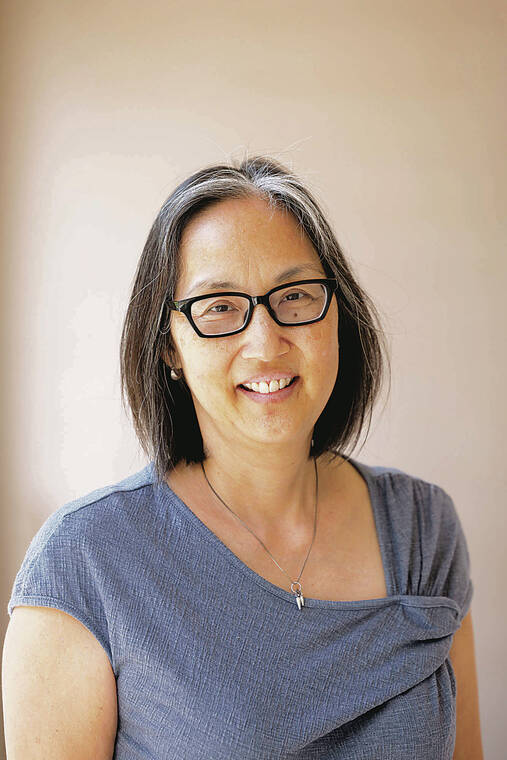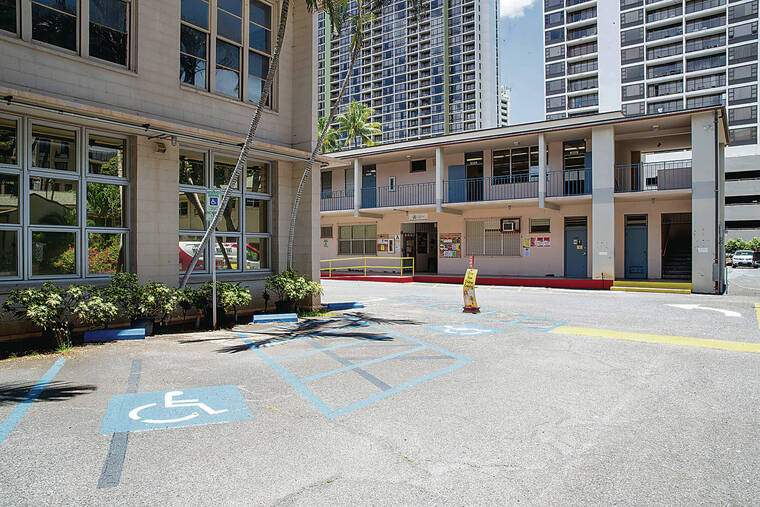The Waikiki Community Center is planning for the first major redevelopment of its site, which could include senior affordable housing to support its goal of providing holistic services.
The nonprofit, which has served the community since 1978, is discussing a collaboration with the Hawaii Housing Finance and Development Corp. to redevelop a portion of its property into a mixed-use facility that could include a preschool, offices and senior affordable housing, according to HHFDC Development Branch Chief Randy Chu.
“Discussions are preliminary at this point,” Chu said in an email. “We look forward to working with WCC to provide enhanced benefits for the Waikiki community.”
Center President Caroline Hayashi said the center is a “one-stop shop” for everything from homelessness prevention to low-cost preschool options, volunteering opportunities, outlets for socializing and other social services such as making sure people have enough to eat, are financially literate and are building savings.
The center serves all of Oahu, though many clients come from Waikiki.
Hayashi said that as the center looks to a future where client needs are likely to be more critical and their complexity requires a breadth of services, it is necessary to redevelop its site, which spans Paoakalani Street and Ohua Avenue. Included are three buildings from the former St. Augustine School that were built in the 1940s and 1950s and are coming to the end of their natural life.
The center site is zoned for building heights of up to 220 feet; however, redevelopment discussions are still in the early stages. Hayashi said details still have to be fleshed out with the site’s owner, the state Department of Land and Natural Resources, and with HHFDC. Even after that occurs, she said moving forward means the center must embark on its most aggressive capital campaign ever.
“We’ve never had a major renovation, and we’ve gotten to the point where things keep breaking down or we are doing expensive patches,” she said.
The site is currently occupied by the community center and its on-site tenants, including United Self Help, Aina Momona, Hope Chapel Waikiki, Hawaiian Community Assets and Waikiki Health, which occupies a separate building on Ohua Street.
During an informational briefing Tuesday at the Waikiki Neighborhood Board, Hayashi said that greater site flexibility is part of the center’s redevelopment vision. She said current site limitations mean there is only room for one large function at a time, and the site’s second-floor space is used sparingly because it lacks an elevator to make it accessible. Modernizing also means putting in air conditioning and technology upgrades, Hayashi said.
While there are many details to work out, she told the Star-Advertiser that a key reason to proceed with a holistic redevelopment plan is the growing evidence that “getting people to the bare minimum is not enough.”
“When you look at a person holistically, it’s not just meeting their critical needs, it also includes meeting social-emotional needs such as addressing loneliness,” she said. “AARP recently cited a study saying that loneliness is more detrimental than smoking a pack of cigarettes a day.”
Hayashi said empowering the growing pool of older residents on Oahu, especially in Waikiki, is a center focus. Those over age 60 make up 30% of Waikiki’s population, according to the latest U.S. Census, and she said that population is expected to increase significantly over the next 20 years.
“Waikiki has one of the highest percentages of older adults in the state, and Hawaii has one of the highest percentages of older adults in the nation,” she said.
Hayashi told the neighborhood board the center is seeing a rise in kupuna who have lived in their space for decades and are now facing rent increases of sometimes more than 50%, or are in imminent danger of becoming homeless because their buildings are being sold or renovated.
“I understand why it’s happening. But the result is we have more kupuna in danger of becoming homeless, and I don’t think any of us want to see that,” she said.
Hayashi told the Star-Advertiser that the center also has made a commitment to continue its Thrive by 5 Affordable Preschool Initiative, which reduces tuition by about 50% for so-called ALICE (asset limited, income constrained, employed) families, who need support to gain access to quality early education.
She highlighted impact summary statistics from 2023 showing the center engaged with more than 20,000 community members, increased holistic wellness for 1,489 kupuna, supported 5,027 community members by distributing 18,815 pounds of food and served 108 families at the preschool.
Several members of the Waikiki community who spoke to the Star-Advertiser expressed support for the redevelopment proposal.
Rick Egged, who serves on the community center board and is president of the Waikiki Improvement Association, said it “makes a lot of sense, as everyone is aware we have a critical housing shortage in Honolulu, particularly in Waikiki.
“This land is state property that is leased for the community center. It’s a compatible use,” said Egged, speaking on his own behalf. “It is clear that the community is looking to be able to develop more housing. Waikiki Community Center could be part of that solution.”
Waikiki Neighborhood Board Chairperson Bob Finley called the affordable housing component “a logical expansion” of the community center.
“We know that we have people with housing challenges in Waikiki and it would be hard to move them to a different district. We should have affordable housing for them,” Finley said. “A lot of progress has been made in taking someone off the street, but if there isn’t any housing, what good are all of those efforts?”
Waikiki resident Denise Boisvert-Jorgensen said, “Offering an affordable housing opportunity to kupuna on the Waikiki Community Center property, conveniently located in the heart of Waikiki’s residential apartment precinct, is a commendable idea. Hopefully it will only be a mid-rise building because it is already a high-density area with several nearby towers obstructing air flow.”
She added, “My main concern would be to have vigilant oversight to ensure that the apartments will remain rentals and be forever affordable. I wouldn’t want a bait-and-switch to condo conversion or rental-market rates to take place after a few years.”
Neighborhood Board member and urban planner Jeff Merz said the center is a good community partner and will likely find ways to mitigate density concerns.
“Now that Waikiki does not require parking with developments, they could provide more green space,” he said. “They could really creatively do something for that area. They haven’t touched it in years; it could use a refresh.”
—
WAIKIKI LIGHTS 2024, PAINT THE TOWN
A fundraiser for the Waikiki Community Cent4er
>> When: Aug. 22 at 5 p.m.
>> Where: Hilton Hawaiian Village Waikiki Beach Resort
>> Honorees: Debi Bishop, managing director Hilton Hawaiian Village; Jackie Reed, CEO of TS Restaurants; Kelly Knox, Southwest Airlines’ corporate responsibility advisor
>> Why: Sponsorship helps the Waikiki Community Center provide programs and services to children and seniors who live and work in Waikiki.
>> Registration: waikikicommunitycenter.org, email jokimura@waikikicommunitycenter.org or call (808)923-1802
>> Ticket prices: $600 for individuals, table prices for eight range from $4,500 to $15,000 depending on the level of sponsorships.




